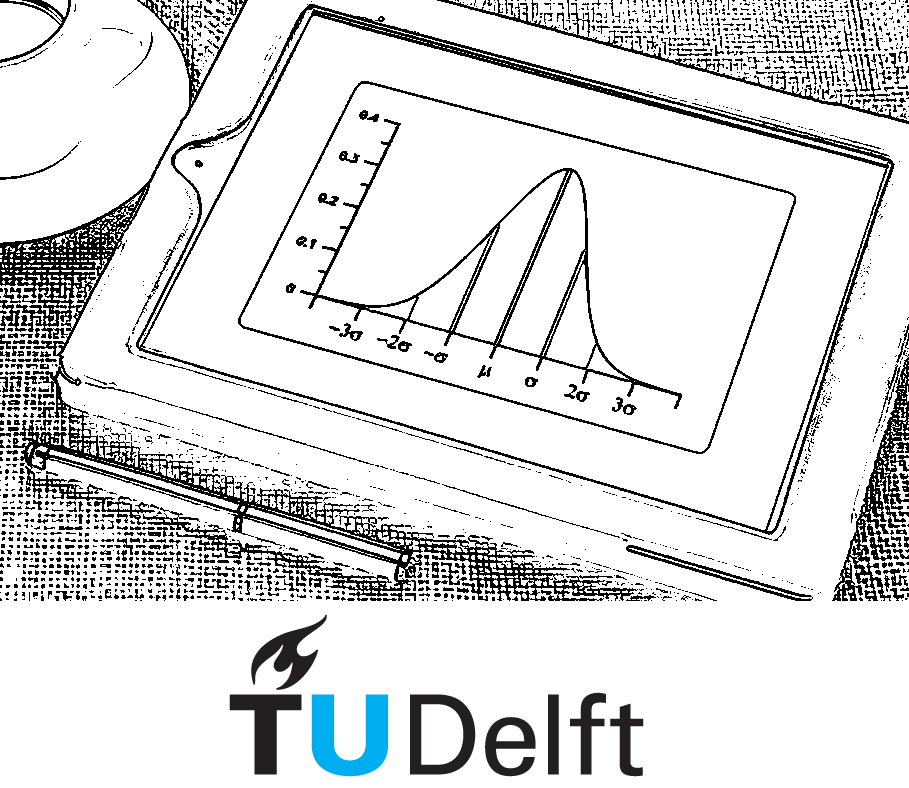Probability and Statistics for Engineers#
Welcome to the online course Probability and Statistics Applications for Engineers. We’re excited to have you join us in this self-paced online course, which is designed to bridge the gap between introductory and more advanced courses in probability and statistics.
What do we mean by “engineers”?
This course was originally developed for students in: Civil Engineering, Environmental Engineering, Applied Earth Sciences and Construction Management and Engineering. These programs are part of the faculty of Civil Engineering and Geosciences at Delft University of Technology in the Netherlands. We try to draw on examples from these fields, but the course contents should be relevant for any engineering or applied geoscience discipline.
This course was originally designed for incoming students to several MSc programs at TU Delft: especially those who have may have taken a high school or university-level course on probability and statistics, but may need to brush up on these concepts. Have you had trouble in the past due to the theoretical or math-oriented nature of these problems? Then this course is for you!
If you have never taken a probability or statistics course before, we recommend you consider one of the online courses offered by the Mathematics faculty at TU Delft: they are also free!
Note to TU Delft Students (MSc programs)
The specific MSc programs at TU Delft that this course is designed for include:
Civil Engineering (CE)
Environmental Engineering (EE)
Applied Earth Sciences (AES)
Construction Management Engineering (CME)
The first three programs are within the faculty of Civil Engineering & Geosciences (CEG), which begin with the module Modeling, Uncertainty and Data for Engineers (MUDE).
CME is an interfaculty program between 1) CEG, 2) Architecture & the Built Environment (ABE) and 3) Technology, Policy & Management (TPM), which begins with the course Managing Uncertainty and Data (MUD).
For all students in the CEG faculty: if you have never taken a university-level course in probability and statistics you are strongly recommended to complete the Probability and Statistics courses offered by our Mathematics department prior to beginning your MSc program—past experience has shown this to help students in all of our MSc programs get through the first semester of studies more easily.
This course assumes some prior knowledge of probability and statistics. Although most of the example calculations illustrated in this course use Python, prior experience with this programming language is not necessary. Python is used because it is adopted in many university-level engineering programs, so we want you to feel comfortable with seeing and making calculations using code before the academic year begins. In other words: in this course, think of Python as a powerful calculator, and you will always be able to understand what the code is doing simply by reading it (not running it). If you are interested in Python, check out our companion course, Python Applications for Engineers—it is set up in a similar format to this course.
This course will enable you to…
Identify important probability and statistics theorems and methods that are commonly used for applications in engineering
Solve basic probability and statistic problems for applications in engineering using concepts such as total probability, Bayes’ rule, continuous and discrete distributions, etc.
Have sufficient prior probability and statistics knowledge to succeed in a MSc-level engineering program at TU Delft.
Course overview#
This online course is divided by general concepts into Sections:
Section 1. General concepts.
Section 2. Discrete random variables.
Section 3. Continuous random variables.
Each Section contains a number of Modules; although they are of different lengths, all are set up with a consistent 3-unit format:
The basic theory of a specific concept.
Example of a specific concept applied to an engineering problem, through step-by-step explanations and short python code blocks.
Introduction of a new problem, to practice applying the method from unit 2.
Depending on your background in probability and statistics, most of the modules can be completed independently.
This course generally does not cover derivations of mathematical concepts, illustrating how the are used instead. If you need more background for a particular module, refer to the Probability and Statistics courses offered by our Mathematics department: the structure of the Sections are aligned, so it should be easy to find many more example problems for these concepts!
How to take the course#
It’s really quite simple: choose a module, read through the first two units, then try applying the concept in unit 3! All of the necessary equations should be provided in the module. Although we illustrate our computation with the Python programming language, you can perform the calculations any way you like: all of the functions used here are implemented in commonly-used software such as Excel, Matlab, Wolfram Alpha, etc., your handheld calculator or even an app on your phone!
Feedback and Corrections#
We appreciate help to identify mistakes in our course. Links will soon be posted here to help us fix them, as well as a short survey to see if you liked the course!
